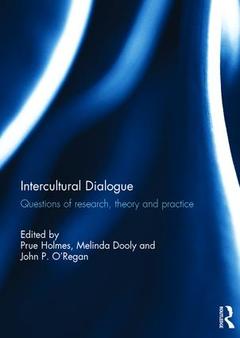Intercultural Dialogue Questions of research, theory, and practice
Coordonnateurs : Holmes Prue, Dooly Melinda, O'Regan John

?Intercultural dialogue?, as a concept and ideology in the European Union, stimulates a rational 21st century society where people can engage in (intercultural) communication on a global scale, and can do so openly and freely in conditions of security and mutual respect. Intercultural dialogue connotes dialogic communication that is peaceful, reconciliatory, and democratic. Yet the term and its accompanying rhetoric belie the intercultural communicative undercurrents and their manifestations that people encounter in their daily lives.
The research-informed chapters in this book, which are situated in international contexts, provide more nuanced understandings, and many even challenge this non-critical ideology by suggesting that the concept of intercultural dialogue is inoperable and problematic under the present conditions of globalisation and migration, where there exists conflict, vulnerability, and instability. The different theoretical perspectives and analyses presented by the authors are a reminder that researchers in the field of intercultural communication require robust and appropriate theories, methods, and pedagogies in order to research these complex conditions and contexts, particularly where different languages and identities are present. The book is also a reminder of how context and power both (re)shape and contest the central tenets of intercultural dialogue?in particular, of who speaks for whom, when, how, and under what circumstances and conditions. This book was originally published as a special issue of Language and Intercultural Communication.
Introduction – Intercultural dialogue: challenges to theory, practice and research1. Ethical communication and intercultural responsibility: a philosophical perspective2. Zones of interculturality and linguistic identity: tales of Ladino by Sephardic Jews in Bulgaria3. Cultural identities in international, interorganisational meetings: a corpus-informed discourse analysis of indexical we4. Faithful imitator, legitimate speaker, playful creator and dialogical communicator: shift in English learners’ identity prototypes5. Interreligious dialogue in schools: beyond asymmetry and categorisation?6. Capabilities for intercultural dialogue7. ‘They are bombing now’: ‘Intercultural Dialogue’ in times of conflictPedagogical Forum 8. The application of general education and intercultural communication in a ‘news-listening’ class9. How pedagogical blogging helps prepare students for intercultural communication in the global workplace10. Intercultural education in primary school: a collaborative project
Date de parution : 03-2016
17.4x24.6 cm
Date de parution : 01-2018
17.4x24.6 cm
Disponible chez l'éditeur (délai d'approvisionnement : 14 jours).
Prix indicatif 56,31 €
Ajouter au panierThème d’Intercultural Dialogue :
Mots-clés :
Intercultural Dialogue; Intercultural Education; European Union; Intercultural Communication; Language and Intercultural Communication; Intercultural Competence; democracy; Reflective Blog Posts; ethical communication; Interreligious Dialogue; globalisation; Intercultural Communication Skills; Intercultural Communication Competence; Face To Face; Legitimate Speaker; intercultural responsibility; ESL Class; migration; Faithful Imitator; multicultural society; Dialogical Communicator; Global Workplace; Competent Intercultural Speaker; Center For Intercultural Dialogue; Capabilities Approach; Intercultural Knowledge; Intercultural Research; GE Curriculum; Varied Cultural Experiences; Sephardic Jews; Corpus Linguistics; Elf



